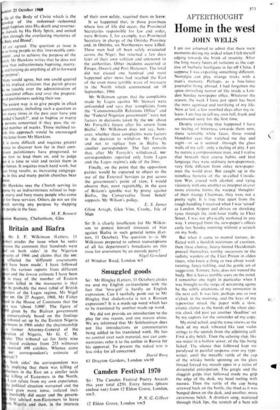Britain and Biafra
Mr J. F. Wilkinson (Letters, 11 ber) evades the issue when he seeks xcuse the comment that 'hundreds were on both sides' in the Nigerian acres of 1966 and claims that the BBC reflected the 'different assessments
have been made'. I have followed ly the various reports from different ces and the lowest estimate I have been to trace of the number of Eastern dans killed in the massacres is that n by probably the most rabid of British orters of the Lagos regime, Mr Nigel er MP. On 27 August, 1968, Mr Fisher ed in the House of Commons that the re was 'about 5,000'. The figure of
given by the Biafran government conservatively based on the findings tribunal set up by the Eastern Nigeria rnment in 1966 under the chairmanship a former Attorney-General of the ration of Nigeria, Mr G. C. M. iuke. This tribunal sat for forty nine heard evidence from 253 witnesses received 498 exhibits. Whence came Bac correspondent's estimate of reds'?
'both sides' the correspondent was ly implying that there was killing of herners in the East on a similar scale he killing of Easterners in the North. I can refute from my own experience. e political situation worsened and the lion grew more tense, isolated inci- inevitably did occur and the govern- first advised non-Easterners to leave rn Nigeria and then, in the interests of their own safety, required them to leave.
It so happened that, in those provinces where loss of life did occur, the Provincial Secretaries responsible for law and order, were Britons. I, for example, was Provincial Secretary in charge of the Onitsha Province and, in Onitsha, six Northerners were killed. These men had all been safely evacuated across the Niger; but returned a few days later of their own volition and unknown to the authorities. Other incidents occurred at Enugu, Owerri and Port Harcourt. The total did not exceed one hundred and most happened after news had reached the East of the even more terrible wave of massacre in the North which commenced on 18 September, 1966.
Mr Wilkinson agrees that the complaints made by Lagos against Mr Stewart were unfounded and says that 'complaints from the "Commonwealth Relations Office" and the "Federal Nigerian government- were not factors in decisions taken by the Bac about Mr Forsyth's future after his return from Biafra'. Mr Wilkinson does not say, how- ever, whether these complaints were factors in the decision to withdraw Mr Forsyth and not to replace him in Biafra by another correspondent. The fact remains that, after Mr Forsyth's withdrawal, BBC correspondents reported only from Lagos and the Lagos regime's side of the lines.
Finally, on the point that the opposition parties would be expected to object to the use of the External Services to put across the government's point of view, I would observe that, most regrettably, in the case of Britain's ignoble war by proxy against Biafra, the Conservative 'front bench' supports Mr Wilson's policy.
E. S. James Glion Arragh, Glen Vine, Crosby, Isle of Man
Sir:It is clearly insufficient for Mr Wilkin- son to protest himself innocent of bias against Biafra in such general terms (Let- ters, 11 October). The question is—is Mr Wilkinson prepared to submit transcriptions of all his department's broadcasts on this issue for assessment by an outside party?
Nigel Gowland 45 Windsor Road, London w5


















































 Previous page
Previous page